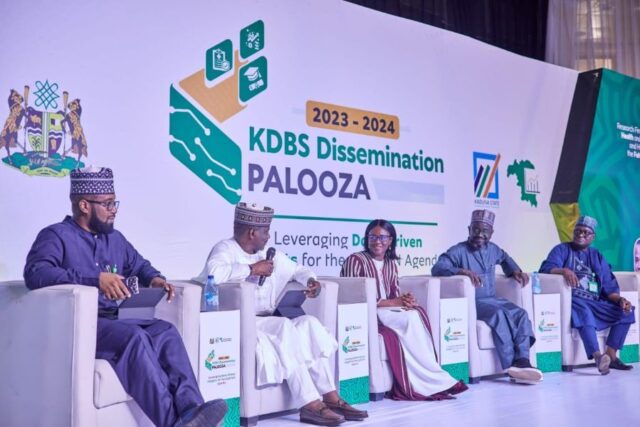
…The Statistician-General, Dr Baba Bukar, during the report presentation of the Access to Financial Services in Nigeria (A2F) Kaduna deep dive Survey report, revealed that financial inclusion has grown from 45% to 64% between 2020 and 2023
THUR OCT 24 2024-theGBJournal| The Kaduna State Bureau of Statistics (KDBS), in partnership with Enhancing Financial Innovation & Access (EFInA) and other key stakeholders, hosted a dissemination event showcasing several reports from the Bureau between 2022 and 2023 and the impact of these findings on policy and Government interventions in Kaduna State.
The Statistician-General, Dr Baba Bukar, during the report presentation of the Access to Financial Services in Nigeria (A2F) Kaduna deep dive Survey report, revealed that financial inclusion has grown from 45% to 64% between 2020 and 2023 driven by an increase in formal financial services.
Despite this, there is a prevailing disparity in gender across rural and urban populations.
The Deputy Governor, Madam Hadiza Balarabe representing the Governor Senator Uba Sani in her speech remarked that “financial inclusion is not just a policy objective, it is the cornerstone of a broader economic empowerment strategy and the report highlights Kaduna’s progress in ensuring that financial services are accessible to all segments of the population especially those in the rural areas, poor, vulnerable and underserved – through innovative solutions aim to bridge the financial inclusion gap bringing banking services closer to every citizen and supporting the entrepreneurs spirit of the people.
During the panel session titled “Kaduna Data Insights: Empowering Growth through Financial Inclusion,” Hon. Mukhtar, the Commissioner of the Planning & Budget Commission, stated “the findings from this report will be used to plan and allocate resources for the 2025 budget. This budget aims to support programs that can improve livelihoods and promote financial inclusion.
Umar Sani, the Senior Special Assistant of KADSIPA, noted that social investment programs have benefited from financial inclusion initiatives. He highlighted that the identities provided by financial institutions and the reach provided by mobile banking and agency banking activities have enabled these programs to be accountable and maintain transparency.
This has resulted in reliable data on the impact of the programs thus far, as well as identifying existing gaps. The State’s Commissioner of Agriculture, Hon. Murtala Mohammed Dabo also highlighted several local policies that support access to finance for farmers within the state such as a database of farmers within the states, farm profile and clustering of farmers to derisk them for financial institutions and private sector investors.
Dr Oluwatomi Eromosele, the General Manager & Research Lead at EFInA, remarked that formal financial inclusion of the adult population in Kaduna state increased from 36% in 2018 to 57% in 2023. This is significant and commendable progress; however, several disparities still exist, with women, farmers, business owners, the rural population, and the poor more likely to be formally excluded.
From a developmental point of view, when we look at financial health, which looks at how well people spend, save, plan, and manage risk in ways that enable them to be resilient and pursue opportunities, we see that just 9% of adults are financially healthy. Additionally, 85% of adults are food insecure, and three-quarters of adults have gone without medication due to a lack of resources.
This picture is similar across all states. We call for subnational governments to partner with the private sector to share and leverage data for targeted policies and innovation that expand access and usage of useful, affordable, secure, and reliable financial services. Prioritising data security, digital infrastructure, and capacity-building will ensure these insights drive inclusive, impactful financial services for all citizens.
EFInA has supported the KDBS in leveraging the Kaduna Deep Dive Survey report to generate insights that can support government intervention and policy action within the state. EFInA remains committed to partnering with the Kaduna State Government and other stakeholders to develop innovative solutions that expand financial access, particularly for the most vulnerable populations, through digital platforms and mobile technology. We are
Commenting on the significance of the event and what it symbolises, EFInA Advocacy Lead, Chinasa Collins-Ogbuo said, “Kaduna has set an impressive and progressive pace, and we are keen to see other States leverage the A2F 2023 sub-national data to drive informed development actions. We invite you to contact us for partnership as we work together to drive impactful initiatives that advance financial inclusion for all Nigerians”.
X-@theGBJournal|Facebook-the Government and Business Journal|email:gbj@govbusinessjournal.com|govandbusinessj@gmail.com









